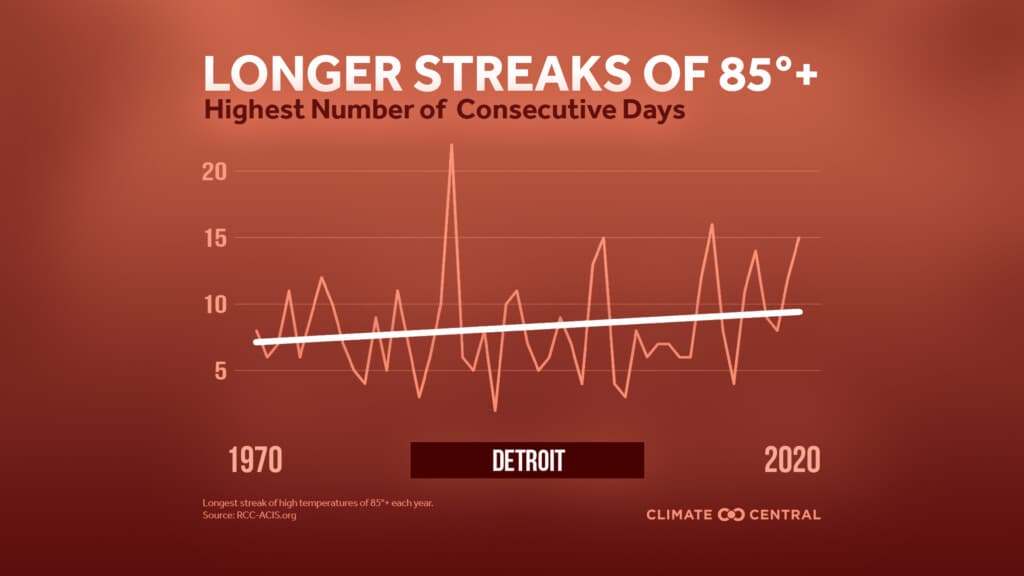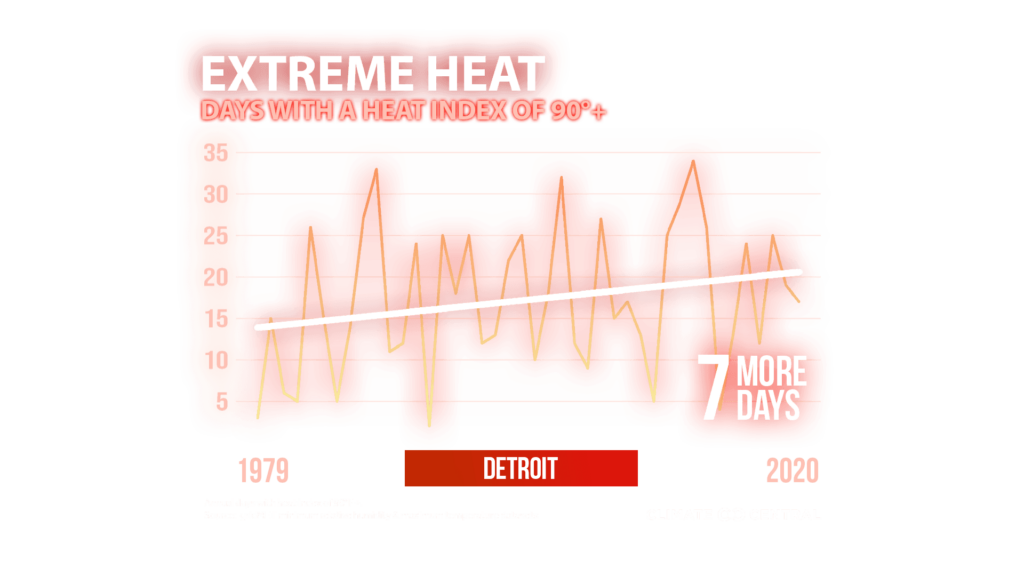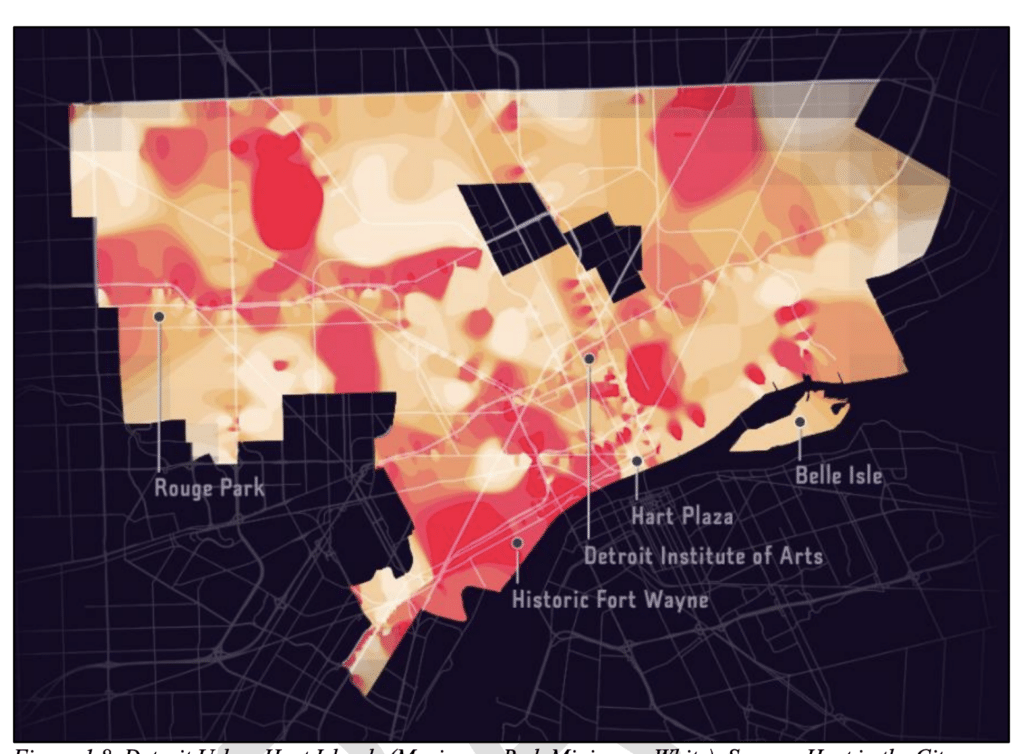Climate change is bringing many changes to Detroit and Michigan. One you’re probably feeling acutely? More frequent summer heat waves – periods of 90-plus-degree weather – which are occurring earlier and later in the season, reaching higher temperatures, and lasting longer. And as we know in Michigan, with the heat comes the humidity.
“What makes the heat even more dangerous is the humidity because that impairs our ability to evaporate sweat – and that’s primarily how we regulate our body temperature,” said Dr. Bradley Uren, an emergency room physician with Michigan Medicine (the University of Michigan hospital in Ann Arbor). “It’s critically important for us to look out for each other. The very old and the young are at particular risk in the middle part of the day when it’s hottest, particularly if they are without air conditioning and shade.”
That’s an acute concern in Detroit, where many homes are old and lack air conditioning and proper insulation. Even if air conditioning is available, it’s expensive to run. And many neighborhoods lack a healthy tree canopy that can shade and cool homes.
A heat wave is not merely an inconvenience. Heat can be lethal. An estimated 600 to 1,300 people die annually in the United States due to heat-related illness.
Here’s your guide to navigating heat waves in Detroit and Michigan amid the climate crisis:
Is climate change increasing the number and duration of heat waves?
What are heat-related illnesses, and how do I treat them?
Who is most at risk for heat-related illness?
What do I need to know about heat waves if I live in an urban area like Detroit?
How can I prepare for a heatwave?
What can I do to stay cool while a heat wave is happening?
Where can I go to stay cool if I don’t have air-conditioning at home?
How do I stay cool at night?
What should I do if I am feeling very ill?
Is climate change increasing the number and duration of heat waves?
The National Weather Service defines a heat wave as a “period of abnormally hot weather generally lasting more than two days.” NWS issues Excessive Heat Warnings if the heat index equals or exceeds 105 degrees Fahrenheit for at least three consecutive hours and Heat Advisories if the heat index is expected to exceed 100 degrees for three consecutive hours. Heat Advisories can be extended into the night if low temperatures are in the 70s or higher.
The service defines the heat index as “what the temperature feels like to the human body when relative humidity is combined with the air temperature.” During heat waves, people are exposed to dangerous levels of heat, and there are more heat-related illnesses, hospitalizations and deaths.
In Detroit, the average number of days per year in which the heat index exceeds 90 degrees increased by seven days between 1979 and 2020, from 14 days to 21 days annually. And that number is set to rise even further. By mid-century, on average, we may see 56 days per year that exceed a 90-degree heat index in the Midwest, even under a “rapid action scenario” of greenhouse gas emission reduction. With no action, the number is projected to climb as high as 62 days per year.
And heat waves are getting longer. The average number of days in the longest streak of 85-plus degree days in a year is two days longer than in 1970 in Detroit.


All that heat will mean more heat-related illnesses and mortality. The number of heat-related deaths in Detroit is projected to rise steeply, from 255 per year between 2020-2029 to more than 700 per year on average by the end of the century.
What are heat-related illnesses, and how do I treat them?
Heat-related illnesses include heat rash, cramps, sunburn, heat exhaustion, heat stroke, and death. Here’s what to watch out for and what to do.
Heat rash: Watch for red bumps that look like clusters of pimples on the skin, especially in the neck, chest, groin, or elbow creases. Treat by staying in a cool place, keeping the rash dry, and using powder.
Sunburn: Watch for painful, red, warm skin and blisters. Treat by avoiding sun exposure, cool cloths or baths, and moisturizing lotion. Do not break blisters.
Heat cramps: Watch for heavy sweating during exercise, muscle cramps or spasms. Treat by stopping physical activity, moving to a cool place, and hydrating. Don’t resume activity until cramps subside. Seek medical attention if cramps last longer than an hour, you have a heart condition, or you’re on a low-sodium diet.
Heat exhaustion: Watch for heavy sweating, cold and clammy skin, fatigue, a fast, weak pulse, nausea or vomiting, headache, dizziness, or fainting. Treat by moving to a cool place, removing or loosening clothes, submerging in cool water or placing wet cloths on your body, and sipping cool water. Seek medical attention if you are vomiting or symptoms worsen or last more than an hour.
Heat stroke: Watch for a high body temperature exceeding 103 degrees, hot, red, dry, or damp skin, a fast and strong pulse, headache, dizziness, nausea, confusion, and fainting. Seek emergency attention immediately by calling 911. Move the person to a cooler place, submerge in cool water or place wet cloths on the body, and do not administer fluids.
Who is most at risk for heat-related illness?
People most vulnerable to heat-related illness include infants and children up to 4 years of age, people aged 65 years and older, and those who are overweight or obese, according to the Centers for Disease Control and Prevention. According to the World Health Organization, heat can exacerbate existing chronic conditions like cardiovascular, respiratory, and cerebrovascular disease and diabetes-related conditions. People who work outdoors in the heat or in hot indoor settings with limited airflow are also at increased risk, according to the American Safety & Health Institute, especially those who must wear protective clothing, like firefighters.
Uren notes that people with heart disease who are on medications to control heart rhythm, control blood pressure, or address heart failure may be at greater risk for heat-related illness. Kidney problems and some psychiatric medications can also affect the body’s ability to regulate its temperature.
“People should speak to their individual doctor about the medications that they are on as to whether they would affect their ability to regulate their body temperature,” Uren cautioned.
Source: Centers for Disease Control and Prevention
What do I need to know about heat waves if I live in an urban area like Detroit?
In Detroit, many low-income residents live without access to air conditioning in their homes. A 2021 University of Michigan study found that nearly half of Detroit homes surveyed had either no access to air conditioning or only partial access via window units.
And a 2020 study found that Detroit residents with poor health and no air conditioning were at greater risk for heat-related illness during extreme heat. The study found that a combined heat wave and power outage could have devastating consequences for Detroit, exposing up to 450,000 residents — roughly two-thirds of the city’s population — to risk of heat-related illnesses.
Michigan ranked fourth in the nation for average annual power interruptions in 2019. And the region’s grid operator has said planned rolling blackouts may be in store for this summer, although DTE Energy has assured customers that won’t happen. According to Citizens Utility Board of Michigan Executive Director Amy Bandyk, DTE’s reliability is slightly worse than all Michigan utilities.
“The most recent five years of available data (2016-2020) show the average time to restore power after an outage was 395 minutes for DTE and 354 for all Michigan utilities. The national average is 221 minutes,” she said.
Many Detroit neighborhoods have poor tree canopy coverage. A healthy tree canopy can cool buildings and surfaces, combating the urban heat island effect in which hard surfaces like roadways and rooftops absorb heat. That absorbed heat is then released at night, increasing local ground temperatures and keeping them higher overnight than in surrounding areas. When temps stay elevated overnight, people lose a crucial opportunity to lower their body temperatures, increasing their risk for heat-related illness.
A heat-mapping exercise conducted by the nonprofit EcoWorks on August 8, 2020 shows pockets of higher temperatures influenced by land use and vegetation. The average annual temperatures of urban heat island areas in Detroit are 1.8 degrees to 5.4 degrees warmer than adjacent areas.

So what can cities do to help low–income communities stay safe during hot weather? One way is to “lift the burden on Black, Latino, and low-income households that spend a disproportionate amount of their income on energy,” according to Dr. Vijay Limaye, a senior scientist for climate and health with the Natural Resources Defense Council.
“Policies that increase access to A/C include home energy assistance programs, protections against cost increases on electric bills, and longer-term efforts to create more affordable housing,” he added. Limaye also called for increasing green space through tree planting or other development.
How can I prepare for a heatwave?
The most important thing to do in any disaster-related circumstance is to plan in advance, according to Dr. Sue Anne Bell, an assistant professor at the University of Michigan’s School of Nursing.
“I recommend reaching out to someone in your close network that you depend on and talking to them about your plans if there’s a disaster in your community,” she said. “And if you don’t have that plan, maybe open that conversation with them about what you should do to start preparing.”
Some things you might think about when preparing your plan for an extreme temperature event include:
- Have a plan to move to a public space with air conditioning like a cooling center, public library, or mall. Or identify a friend or relative with an air conditioning or a cooler home you can stay with.
- Make a plan for how you will keep your pets cool – especially if you need to evacuate your home.
- Install air conditioners with tight-fitting insulation.
- Have fans at the ready to help with air circulation.
- Install coverings over windows that receive morning or afternoon sun with drapes, shades, awnings or blinds.
- Install temporary window reflectors to deflect heat away from the house.
- Add insulating weather strips to doors and windowsills to keep in cool air.
- Check in with your neighbors who are elderly, young, or in poor health and may need extra help.
- Get trained in first aid to learn how to treat heat-related emergencies.
- In the longer-term, plant shade trees around your house and in your neighborhood.
Sources: Weather Underground, FEMA
What can I do to stay cool while a heat wave is happening?
“It’s important to remember that heat deaths and illnesses are preventable — if we take heat threat seriously,” Limaye told Planet Detroit. “The simplest advice for handling extreme heat comes from the CDC: ‘Stay Cool, Stay Hydrated, Stay Informed.’” Here are some things you can do to stay cool during a heat wave:
- Stay updated on the weather report.
- Limit the amount of time you spend outdoors and limit exertion.
- When you are outdoors, find shade if possible or wear a wide-brimmed hat to protect your face from the sun. Wear light and loose clothing.
- Use fans if you don’t have access to air conditioning at home.
- Never, ever leave kids or pets alone in a car. Lock unattended cars so kids don’t get trapped inside by accident.
- Eat lightly – avoid hot, heavy meals.
- Stay hydrated. Keep your pets hydrated. If you have kidney disease, Uren advises talking to your doctor about taking special precautions to avoid becoming dehydrated.
- Watch for signs of heat-related illness and take action to treat them.
- Cool down by spritzing water on your skin, taking a cool shower, or immersing yourself in a cool bath.
- Replace salts and minerals if you’re sweating a lot by drinking a sports drink. Avoid sugary or alcoholic drinks – they can dehydrate you.
- Check on those in your neighborhood who are elderly, young, or in poor health and may need extra help.
- Consider moving to a place with air conditioning, particularly during the hotter part of the day.
Where can I go to stay cool if I don’t have air-conditioning at home?
If you don’t have air conditioning and feel uncomfortable, consider moving to an air-conditioned space, especially during the hottest part of the day. That may be a public building or another public space like a mall, restaurant, or movie theater.
“You really have to pay attention to your body’s cues. No one knows your own body like yourself,” said Dr. Jason Vieder, an emergency room physician at Henry Ford Hospital.
The City of Detroit operates cooling centers at the locations listed below.
- Adams Butzel Complex, 10500 Lyndon (Monday-Friday, 8 a.m.-9 p.m.; Saturday, 10 a.m.-6 p.m.)
- Farwell Recreation Center, 2711 E. Outer Drive (Monday-Friday, 11 a.m.-7 p.m.)
- Lasky Recreation Center, 13200 Fenelon (Monday-Friday, noon-8 p.m.)
- Patton Recreation Center, 2301 Woodmere (Monday-Friday, 8 a.m.-8 p.m.; Saturday, 10 a.m. – 6 p.m.)
- Kemeny Recreation Center, 2260 S. Fort (Monday-Friday, 8 a.m.-9 p.m.; Saturday, 10 a.m.-6 p.m.)
- Crowell Recreation Center, 16630 Lahser (Monday-Friday, 1-9 p.m.)
- Heilmann Recreation Center, 19601 Crusade (Monday-Friday, 8 a.m.-9 p.m.; Saturday, 10 a.m.-6 p.m.)
All Detroit Public Library locations offer relief from extreme temperatures.
- Main Library, 5201 Woodward Ave.
- Bowen Branch, 3648 Vernor Hwy,.
- Campbell Branch, 8733 W. Vernor Hwy.
- Chandler Park, 12800 Harper
- Chaney, 16101 Grand River
- Chase, 17731 W. 7 Mile Rd.
- Conely, 4600 Martin
- Douglass, 3666 Grand River
- Duffield, 2507 W. Grand Blvd.
- Edison Branch, 18400 Joy Rd.
- Elmwood Park, 550 Chene
- Franklin
- Knapp, 13330 Conant
- Jefferson Branch, 12350 E. Outer Dr.
- Lincoln, 13651 E. McNichols
- Parkman Branch, 1766 Oakman Blvd.
- Redford Branch, 21200 W. Grand River Ave.
- Sherwood Foreset, 7117 W. 7 Mile Rd.
- Wilder Branch, 7140 E. Seven Mile Rd.
Additional cooling centers can be found in Wayne County, Oakland County, and Macomb County.
How do I stay cool at night?
Cooling down at night is very important during a heat wave. The body needs a chance to recover from heat. When it can’t, the physiological stress of heat exposure accumulates in the body, exacerbating chronic diseases and increasing the risk for heat-related illness. Warm nighttime temperatures can disrupt sleep, which also exacerbates disease risk. Moving to the coolest room in the home and wearing loose, cotton clothing may also help.
What should I do if I am feeling very ill?
If you or someone you are with are feeling the symptoms of heat exhaustion or heat stroke – muscle cramps, fatigue, nausea, headache, confusion – and aren’t feeling better even after trying to cool down, seek medical attention right away by calling 911, heading to the ER or a health clinic, or seeing a physician.
“I’d rather see someone early on and reassure them as opposed to when somebody waits too long and needs more intensive therapy,” Vieder said. “So if you’re concerned, you can always come to the emergency department. There’ll be air conditioning, and if you need medical attention, we’re happy to take care of anyone who comes to the door.”

